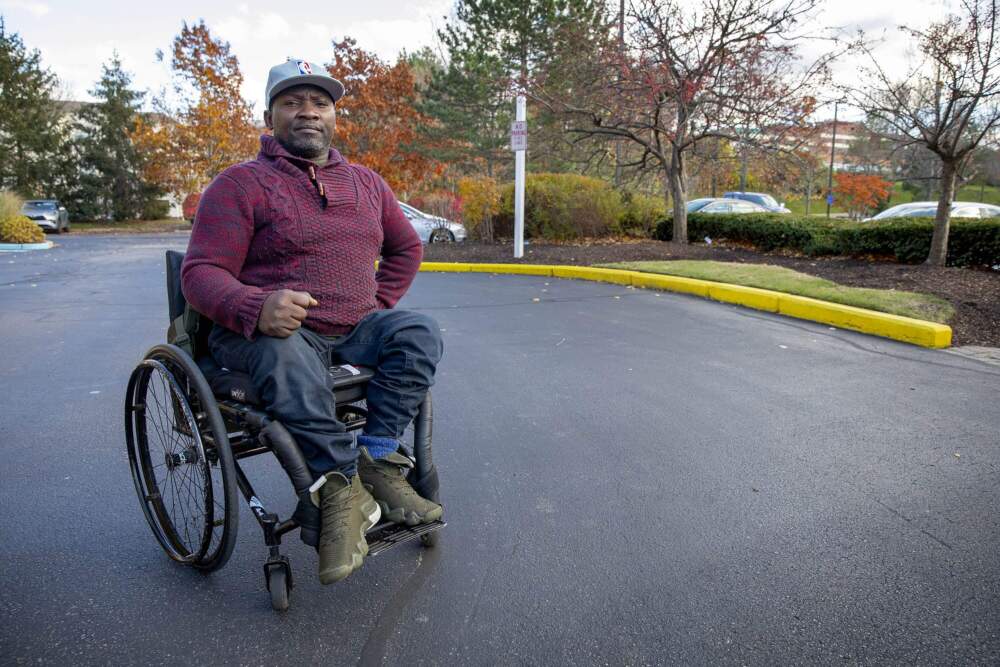Advertisement
Wheelchair repairs can take months; Mass. Senate passes bill aimed at fixing that

In a 39-0 vote, the Massachusetts Senate passed a wheelchair repair bill Thursday that would substantially strengthen the state's wheelchair warranty law. Advocates and lawmakers said it would bring the commonwealth in line with other states on wheelchair warranty protections.
The bill received criticism from some wheelchair manufacturers and vendors, who said it fails to address important issues such as preventive maintenance and the cost of repairs.
Researchers estimate that more than half of wheelchairs break down in a typical six-month period. When a wheelchair breaks, the person who uses the chair can wait months for repairs, affecting their daily life, income, health and access to medical care.
Experts say one of the main reasons wheelchair repairs take so long is due to red tape from medical insurers and wheelchair manufacturers. Plus, they say manufacturers are often not fully compensated for the time it takes to complete repairs.
“We have a marketplace that's really broken for people who rely on wheelchairs for their mobility and their independence,” said Sen. John Cronin, a Fitchburg Democrat and the bill’s sponsor. He said new protections in the bill would be “huge” for wheelchair users’ daily lives.
If the repair measure becomes law, Massachusetts would require a minimum two-year warranty for all wheelchairs — up from one year for only some wheelchairs under the current state law.
The bill would set time limits for how quickly manufacturers must assess defective chairs and provide loaner chairs. It would also prohibit health insurance companies from requiring prior authorization from a doctor for repairs estimated to cost under $1,000.
“I think it’s absolutely huge,” said Lyn Horan of Holyoke, who has used a wheelchair for eight years because of multiple sclerosis. Her wheelchair costs roughly $45,000 and she once had a repair take six months.
“It is more than a car to us. It is like our legs,” she said. “And then when it goes and breaks down, we can't even do the simplest sorts of functions to maintain our independence.”
Horan said she’d like to see the warranty extended to five years since that’s how long many health insurance companies require patients wait before getting a new chair. However, she still cheered the senate’s passage of the measure.
“It puts the companies on notice that the state governments are watching,” said Horan.
The National Coalition of Assistive and Rehab Technology, an industry group, said it supports some elements of the legislation “like eliminating prior authorization which slows down the process by 7-15 days for most consumers.”
But Wayne Grau, the group's executive director, said the Senate bill lacks elements found in a House bill, including funding for a preventative maintenance program for wheelchairs, as well as reimbursing travel to the consumer's home for repairs.
Advertisement
“80% of our repairs are done in the consumer's home, and this unfunded mandate needs to be addressed,” Grau said.
Other critics have spoken out against the increased warranty period.
“I don’t think that is the right way to go,” said Jan Soderquist, CEO and founder of Rehabilitation Equipment Associates, a wheelchair vendor in New England. “Instead of getting all excited about extended warranties, they [should] consider some type of a preventive maintenance plan so that equipment is reviewed, so there is a code and a reimbursement for that.”
In the past, similar bills have failed to become law, but Cronin thinks new public pressure due to media coverage of the issue and the mobilization of disability advocates will change the bill's prospects this time around.
“There's so much attention to this issue,” he said. “So, I’m optimistic.”
The Massachusetts House has not yet scheduled a vote on the corresponding bill.
This article was originally published on January 04, 2024.
